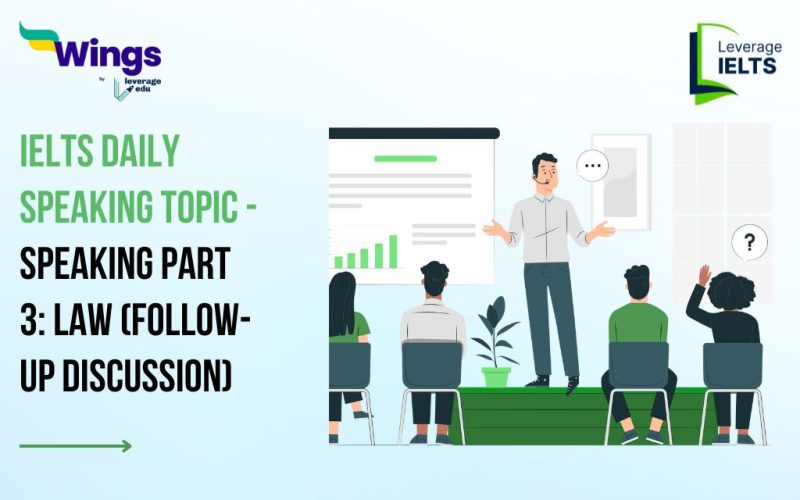Discussion Topics
- The Role of Law in Society
- Law Enforcement
- Controversial Laws
Follow-up questions
1. The Role of Law in Society
Ans. Laws play an important role in maintaining social order and protecting the rights of individuals. They serve as a set of rules that a society is expected to follow. By defining what is acceptable and what is not acceptable, laws provide a clear framework for citizens to live by to maintain peace and order. For example, traffic laws help us recognize how we should behave on the road. They help in preventing chaos on the roads and protect the safety of all road users. And in terms of protecting individual rights, laws ensure that every person is treated fairly and equally, For example, laws against discrimination help in protecting people from unfair treatment based on their race, gender, age and religion.
Q.2. Can you discuss a law that you believe has significantly impacted society?
Ans. I think one of the laws that has significantly impacted society is the Prohibition of Child Marriage Act of 2006. This law addresses the widespread issue of child marriage and sets the legal age of marriage to 18 for females and 21 for males. This law protects the rights of children, particularly girls, who get the opportunity to complete their studies. This law also improved health outcomes as early marriages often led to early motherhood, which had a significant impact on both the mother and child.
2. Law Enforcement
Q.1 Can you discuss the challenges faced by law enforcement officers in their daily duties?
Ans. Law enforcement officers often face a variety of challenges during their daily duties. One of the major challenges is dealing with dangerous situations. For example, they often have to respond to emergencies where there is a risk of violence, such as domestic disputes or robbery. Another challenge that I think they have to face is the emotional and mental stress associated with the job. Law enforcement often have to encounter traumatic situations which can lead to stress and burnout. For example, one of my known is in the police and sometimes they tell us how they have to deal with cases such as child abuse or fatal road accidents which can be very emotionally draining experiences to witness.
Q.2. What are the primary responsibilities of law enforcement agencies?
Ans. Law enforcement agencies have various responsibilities. One of them includes maintaining law and order in the country. This often includes enforcing laws, preventing crime and protecting life and property. For example, they might have to patrol neighbourhoods to deter crime or respond to emergency calls. Another important responsibility of them includes investigating the crimes. This involves gathering evidence and interviewing witnesses to bring offenders to justice. For instance, recently I saw a web series on a burglary case, where law enforcement officers collected forensic evidence from the crime scene and then used it to find the suspect.
3. Controversial Laws
Q.1. Can you name a controversial law in your country and explain why it’s controversial?
Ans. One of the most controversial laws in India is the Citizenship Amendment Act (CAA). This law was implemented in 2019 and offers an exemption to non-muslim illegal immigrants from neighbouring countries. It created India’s first religion-based citizenship test, which has been criticised because of its discriminating nature against Muslims and some other refugees. TH law sparked massive protests in the entire country. Another controversial law was Article 370, which granted autonomous status to Jammu and Kashmir. The government removed Article 370 in 2019, which caused a lot of protests and anger against their decision.
Q.2. How should lawmakers address the controversy surrounding certain laws?
Ans. Lawmakers can address the controversy by encouraging open and inclusive dialogues from people who are both directly or indirectly affected by the law. It helps in understanding different perspectives and finding common ground. Apart from this, they can also ensure that proper transparency is there in the law-making process, which means sharing proper reasons behind the law and sharing proper benefits and drawbacks. For example, in the case of CAA, the lawmakers could have engaged in more extensive dialogues with various communities before implementing the law. Similarly for Article 370, a more transparent process with clear communication about the reasons for its removal could potentially reduce the controversy.
Are you preparing for IELTS? Check out this video to improve your speaking skills for the IELTS exam given below👇.
Download the Leverage IELTS App today.


Need help to prepare for IELTS? Check out the best IELTS preparation courses in the market offered in a live training environment by trusted educators in a live training environment. If you want help studying abroad, call 1800-572-130.
 One app for all your study abroad needs
One app for all your study abroad needs
















 45,000+ students realised their study abroad dream with us. Take the first step today.
45,000+ students realised their study abroad dream with us. Take the first step today.